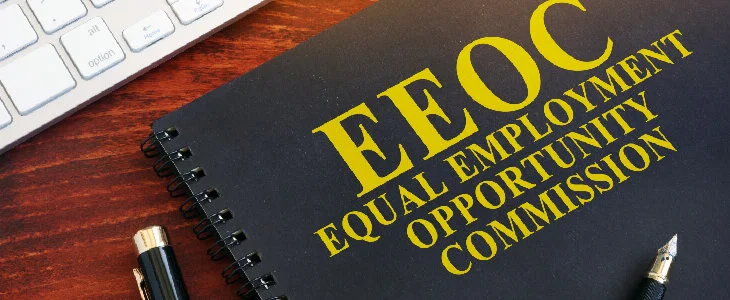The U.S. Equal Employment Opportunity Commission (EEOC) is responsible for enforcing federal anti-discrimination and harassment laws. Federal law makes it illegal for employers to discriminate against job applicants or employees because of the person’s race, color, sex, religion, national origin, disability, genetic information, or age. Under federal anti-discrimination laws, sexual harassment is considered a form of sex-based discrimination. The EEOC has the power to require employers to compensate employees for discrimination. EEOC representation lawyers help clients navigate the EEOC claims process, from submitting the initial claim to representing clients during mediation.
At Lipsky Lowe LLP, our New York City sexual harassment lawyers have decades of combined experience fighting for the rights of our clients. Our lawyers have a thorough understanding of the process of filing a claim with the EEOC. We know how to investigate claims, find supporting evidence, and submit a compelling claim. If you have suffered discrimination or harassment at your workplace and you’re unsure how to proceed, we can help. Contact our EEOC representation lawyers today to schedule your free consultation.
What is the EEOC?
The EEOC is an independent government agency formed in 1964 to enforce Title VII of the Civil Rights Act and additional federal anti-discrimination laws. The EEOC interprets federal laws prohibiting discrimination and enforces those laws. Before an employee has a right to bring a claim against an employer in federal court, he or she must file a claim with the EEOC. In order to enforce the laws, the EEOC holds hearings, issues administrative regulations that interpret anti-discrimination laws, and litigates employment discrimination cases. The EEOC enforces the following federal laws that prohibit employment-based discrimination:
- Title VII of the Civil Rights Act of 1964
- The Pregnancy Discrimination Act
- The Equal Pay Act
- The Americans with Disabilities Act (ADA)
- The Age Discrimination in Employment Act (ADEA)
- The Genetic Information Nondiscrimination Act (GINA)
Requirements for Filing an EEOC Claim
Understanding the requirements for EEOC claims is essential. The EEOC only evaluates certain types of discrimination and harassment claims. The following are the essential criteria for filing an EEOC claim:
- The employer must regularly employ at least 15 people
- For age discrimination cases, the employer must employ at least 20 people
- In New York, claimants must file their claim within 300 days of the discriminatory act
- The claimant must be an employee, not an independent contractor
- Job applicants employees, former employees, and participants may file a claim
- American citizens employed by U.S. companies located internationally are protected
- Only claimants age 50 or older may submit an EEOC claim for age discrimination
Claimants who are not qualified to file a claim with the EEOC may have other options for receiving compensation. For example, an independent contractor cannot file an EEOC claim, but he or she may be able to file a claim under New York City laws and possibly under federal anti-racial discrimination laws. Additionally, claimants under the age of 40 may file a claim for age-based discrimination under New York City law. If you are unsure whether you have a right to file a claim with the EEOC, the skilled EEOC representation lawyers at Lipsky Lowe LLP can advise you as to your best legal option for seeking compensation.
Submitting a New York City EEOC Discrimination Complaint
After submitting a claim with the EEOC, the EEOC investigates the claim and determines whether the claimant is entitled to compensation. When the EEOC determines that the employer did not violate the law, it provides the claimant with the right to bring a lawsuit in a court of law. After filing a claim with the EEOC, the Commission will investigate the claim and invite both parties to mediation, if necessary. When the Commission determines that the employer did engage in unlawful discrimination, the victim may be entitled to compensation.
What Happens During the EEOC Mediation Process?
Once you file a claim with the EEOC, an EEOC representative will contact the employee and the employer to ask if both parties would like to agree to mediation voluntarily. Should both parties agree to mediation, the representative will schedule the sessions with a trained mediator. The mediator acts as a neutral third-party who confidentially works to help both parties come to an agreement.
A mediation session often lasts three to four hours. Most mediation sessions are not adversarial. We recommend bringing one of the skilled EEOC representative lawyers from Lipsky Lowe LLP to the mediation sessions. Our attorneys know how to advocate for the best interests of our clients during the mediation process. After a successful mediation session, both parties will sign a legally enforceable agreement. When one or both parties decline voluntary mediation, or the parties cannot reach an agreement during mediation, the EEOC will proceed with an investigation of the claims.
What Remedies Are Available for Successful EEOC Claimants?
The goal of the Commission is to put the victim of discrimination in the same position he or she would have been in had the discrimination not taken place. Depending on the facts of the case, victims may be entitled to remedies for past and future lost wages. The Commission may also give the victim non-compensatory remedies for any emotional distress they suffered. If the employer acted egregiously, the Commission has the power to award punitive damages to punish them for their intentionally harmful actions.
Our EEOC Representation Lawyers Will Help You Succeed
Suffering from harassment or discrimination in your workplace can be extremely stressful. At Lipsky Lowe LLP, we understand how stressful going to work in a toxic environment can become. Our skilled employment lawyers know what it takes to file a winning EEOC claim or discrimination lawsuit in court. We know the ins and outs of the EEOC mediation process and fight hard for our clients to obtain as much compensation as possible. Contact our New York City employment law firm today to schedule your free case evaluation and learn how we can help you.
